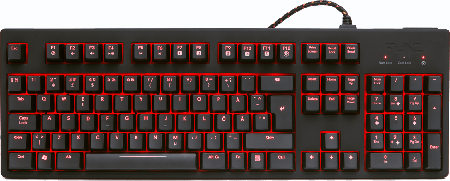 I use a Func KB-460 keyboard with Nordic layout – that basically means it is a qwerty design with the Nordic keys for “åäö” on the right side as shown on the picture above. (yeah yeah Swedish has those letters fairly prominent in the language, don’t mock me now)
I use a Func KB-460 keyboard with Nordic layout – that basically means it is a qwerty design with the Nordic keys for “åäö” on the right side as shown on the picture above. (yeah yeah Swedish has those letters fairly prominent in the language, don’t mock me now)
The most annoying part with this keyboard has been that the key repeat on the apostrophe key has been sort of broken. If you pressed it and then another key, it would immediately generate another (or more than one) apostrophe. I’ve sort of learned to work around it with some muscle memory and treating the key with care but it hasn’t been ideal.
This problem is apparently only happening on Linux someone told me (I’ve never used it on anything else) and what do you know? Here’s how to fix it on a recent Debian machine that happens to run and use systemd so your mileage will vary if you have something else:
1. Edit the file “/lib/udev/hwdb.d/60-keyboard.hwdb”. It contains keyboard mappings of scan codes to key codes for various keyboards. We will add a special line for a single scan code and for this particular keyboard model only. The line includes the USB vendor and product IDs in uppercase and you can verify that it is correct with lsusb -v and check your own keyboard.
So, add something like this at the end of the file:
# func KB-460
keyboard:usb:v195Dp2030*
KEYBOARD_KEY_70031=reserved
2. Now update the database:
$ udevadm hwdb –update
3. … and finally reload the tweaks:
$ udevadm trigger
4. Now you should have a better working key and life has improved!
With a slightly older Debian without systemd, the instructions I got that I have not tested myself but I include here for the world:
1. Find the relevant input for the device by “cat /proc/bus/input/devices”
2. Make a very simple keymap. Make a file with only a single line like this:
$ cat /lib/udev/keymaps/func
0x70031 reserved
3 Map the key with ‘keymap’:
$ sudo /lib/udev/keymap -i /dev/input/eventX /lib/udev/keymaps/func
where X is the event number you figured out in step 1.
The related kernel issue.
